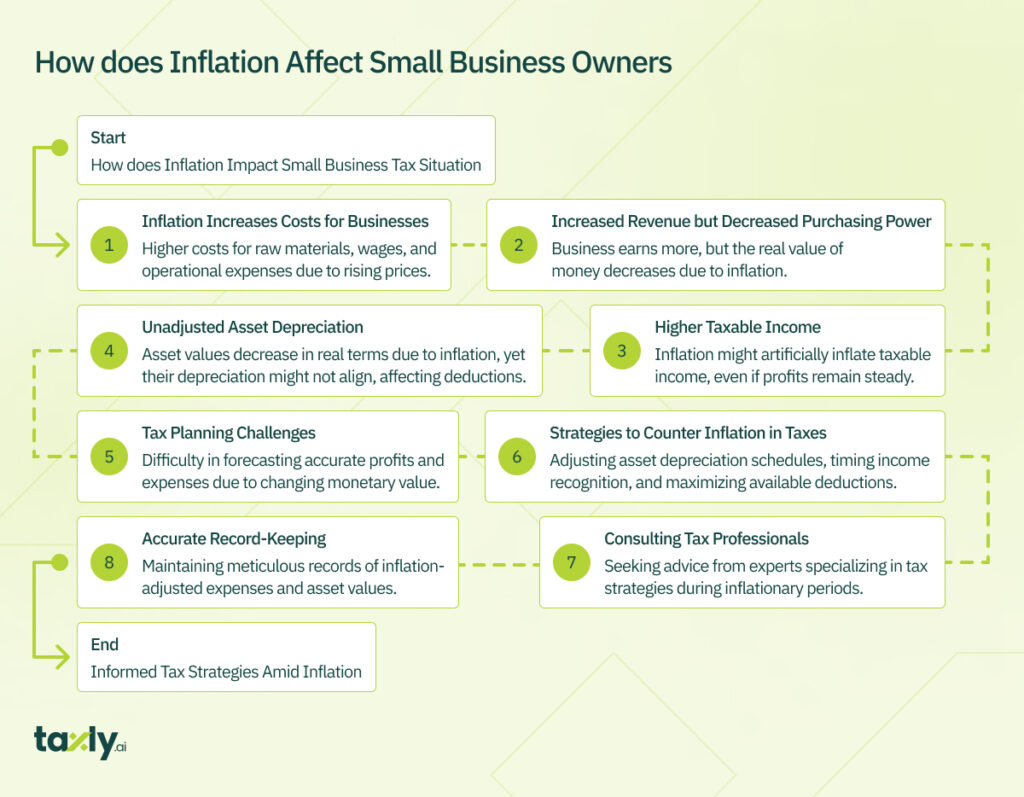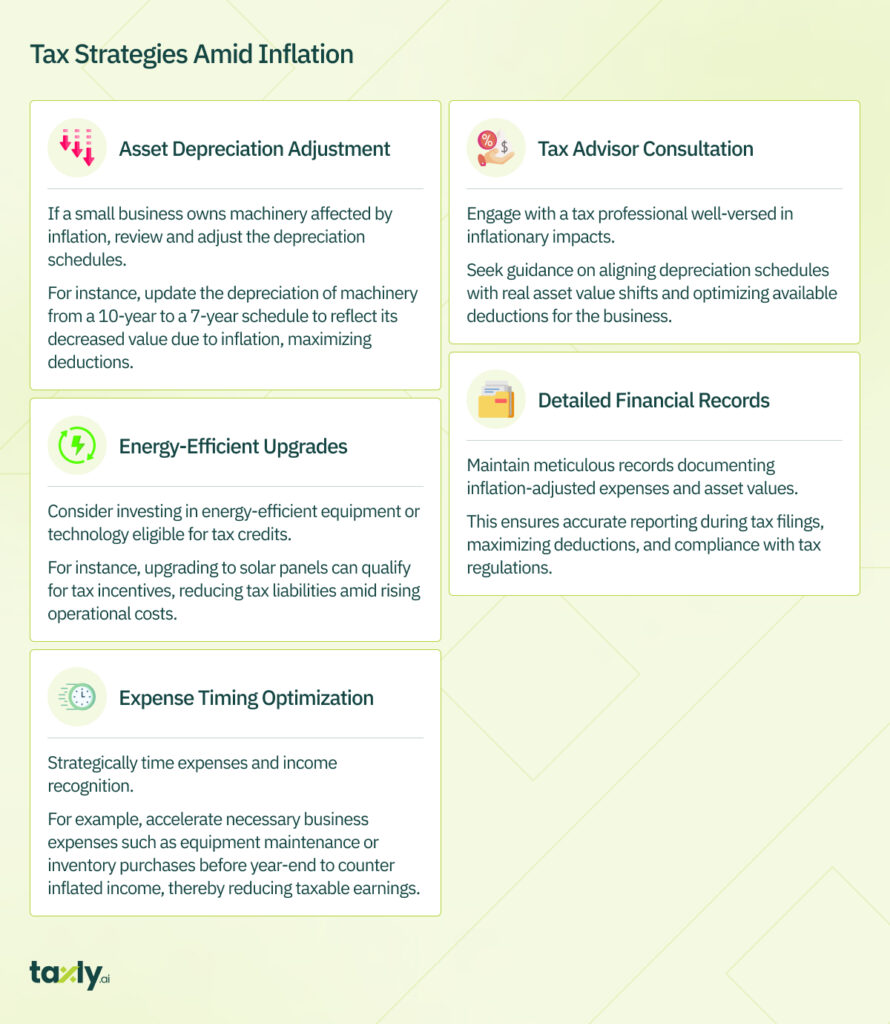In this blog, I will discuss how to deal with inflation as a small business owner in Australia. Inflation hits small business owners hard for a few reasons: When prices for goods and services across the board rise, small businesses face higher costs too. If they can’t or don’t raise their own prices to match, their profit margins shrink. Imagine paying more for supplies but not being able to charge customers more for your product or service—that’s a tough spot.
Small businesses operate on thin margins. When inflation jacks up costs, it can strain their cash flow. They might struggle to pay bills, cover payroll, or invest in growing the business because more money goes out than comes in.
What is Inflation?
Inflation is the persistent increase in the general price level of goods and services in an economy over time. It’s often measured as a percentage and reflects the decrease in purchasing power of a currency. When inflation occurs, the same amount of money buys fewer goods and services than it did previously.
How does Inflation Affect Small Business Owners:

Rising Costs:
Small businesses face increased expenses for raw materials, utilities, wages, and operational costs. For instance, if the cost of raw materials used in production rises due to inflation, it squeezes profit margins unless prices are adjusted accordingly.
Consumer Behavior Changes:
Inflation can alter consumer behavior. Customers may become more price-sensitive, affecting demand for certain products or services. Businesses might need to adjust marketing strategies or product offerings to cater to changing consumer preferences during inflationary periods.
Financial Planning Challenges:
Inflation disrupts financial planning for small businesses. Budgets may need frequent revisions as the value of money changes, impacting revenue forecasts and investment decisions.
Suggested Read: Investment Property Tax Deductions in Australia Explained
Tax Implications:
Inflation influences tax situations for small business owners in several ways:
- Taxable Income Increase: Inflation might artificially inflate taxable income due to higher prices, even if real profits remain constant. This could lead to higher tax liabilities.
- Asset Depreciation: Assets might lose value in real terms due to inflation, yet their tax depreciation might not align with this decreased value, affecting deductions.
Cash Flow Problems:
Inflation can strain cash flow as costs rise but revenues might not immediately catch up. This can affect a business’s ability to meet financial obligations like loan repayments or supplier payments.
How to Deal with Inflation as a Small Business Owner?
Here are some solid strategies on how to deal with inflation as a small business owner:
Review Pricing Strategies:
Conduct a cost analysis to identify where prices can be adjusted. For instance, if you run a café, consider increasing prices on select menu items marginally (e.g., $0.50-$1) based on the rising cost of ingredients like coffee beans or dairy products.
Negotiate with Suppliers:
Reach out to key suppliers to discuss fixed pricing or bulk discounts. For example, if you’re a small clothing retailer, negotiate terms with fabric suppliers to lock in prices for a specified duration, ensuring stable costs for upcoming product lines.
Efficiency & Cost Management:
Implement inventory management software to track stock levels and prevent overstocking, reducing storage costs. Additionally, renegotiate contracts with service providers or explore energy-efficient solutions to lower utility bills.
Suggested Read: Can You Claim Deductions Without Receipts in Australia?
Monitor Cash Flow:
Strategically time payments to suppliers by taking advantage of early payment discounts or negotiating extended payment terms. Simultaneously, tighten credit policies to ensure timely collections from customers.
Evaluate Investments:
Prioritize investments in technology that directly optimize processes and reduce costs. For example, invest in customer relationship management (CRM) systems to streamline sales and marketing efforts, aiming for quicker returns.
Diversify Product/Service Offerings:
Expand your product line by introducing complementary items. For instance, if you have a skincare business, consider adding accessories like applicators or travel-sized sets to attract a broader customer base.
Customer Communication:
Create educational materials or newsletters explaining the impact of inflation on pricing. Offer loyal customers a heads-up about impending price adjustments and provide exclusive discount codes or early access to soften the impact.
Review Financial Plans:
Adjust financial forecasts to incorporate higher costs. Revisit budgets and create scenarios to anticipate different levels of inflation, allowing for proactive decision-making and adaptation.
Explore Government Support:
Research and apply for grants or financial assistance programs tailored for small businesses affected by inflation. Government bodies often offer support in the form of subsidies or low-interest loans during economic challenges.
Tax Management Amid Inflation:
Tax Management is a great way for small businesses to deal with inflation.

Here are some steps you can take to manage your finances during inflation:
Depreciation and Asset Adjustment:
Review and adjust your depreciation schedules to reflect the impact of inflation on asset values. Consider accelerating depreciation on certain assets affected by inflation to claim larger deductions sooner, thereby reducing taxable income.
Example: If you run a manufacturing business, machinery and equipment could be affected by inflation. Adjust the depreciation schedule to reflect their decreased value due to inflation, allowing for higher deductions on these assets.
Research Tax Credits and Incentives:
Research available tax credits or incentives that align with investments or expenses mitigating the effects of inflation. Invest in assets or technologies that qualify for tax breaks to offset increased costs.
Example: Energy-efficient upgrades might qualify for tax credits. If you upgrade your office space with energy-saving lighting or HVAC systems, you could be eligible for tax incentives that reduce your tax burden.
Timing of Expenses and Income:
Actionable To-Do: Strategically time expenses and income recognition to optimize tax benefits. Consider delaying income recognition to a subsequent tax year and accelerating deductible expenses into the current year to offset higher taxable income due to inflation.
Example: If possible, delay invoicing customers until the next tax year while ensuring expenses like repairs, maintenance, or necessary purchases are made before year-end to maximize deductions.
Consult with Tax Professionals:
Engage a tax advisor or accountant well-versed in inflationary impacts on taxes. Discuss potential tax-saving strategies tailored to your business circumstances, ensuring compliance while maximizing benefits.
Example: Schedule a meeting with a tax consultant to evaluate your business’s situation. They can provide insights on specific deductions or credits applicable to your industry, aiding in creating a tax-efficient strategy.
Keep Detailed Records:
Maintain meticulous records of all expenses, investments, and income adjustments made to counter inflation. Accurate documentation ensures you capture all potential deductions and credits during tax filing.
Example: Utilize accounting software or systems that track inflation-adjusted costs of goods sold (COGS), expenses, and asset values. These records will be valuable during tax preparation.
The Bottomline
These tax management strategies help small business owners can lift some of the inflation strain on their taxable income, optimize deductions. It will also help you leverage available incentives to become more financially stable amidst rising costs.
Discover More Topics


Comments are closed